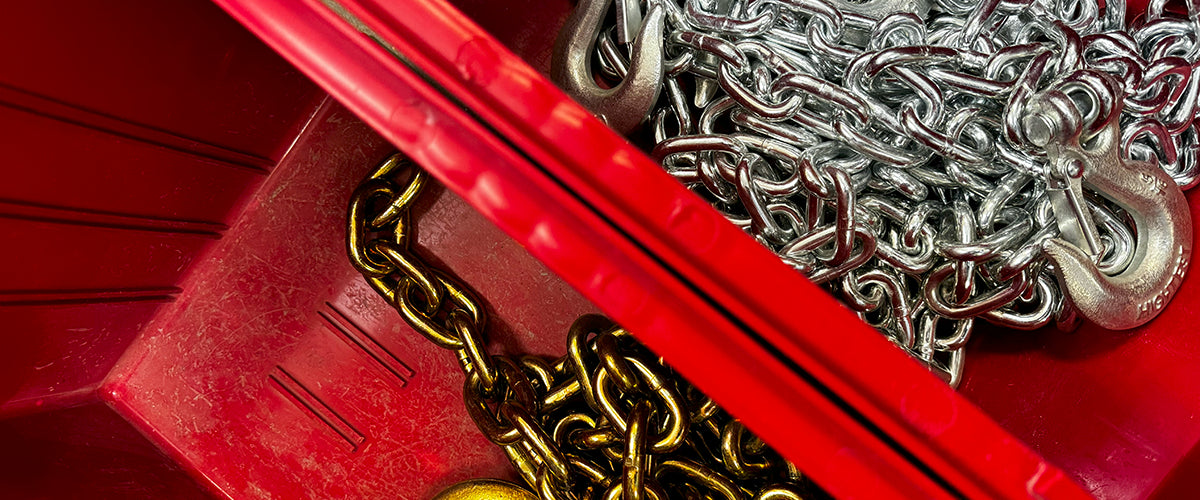Not sure which chain grade you need? 🤔
We’ve got you covered! 👍
Learn how to choose the right safety chains for your needs in our detailed guide.📖
Chain Grades and Abbreviations
-
G30 (Grade 30) – Proof Coil Chain
Characteristics: Made from low-carbon steel.
Strength: The lowest strength among the common chain grades, suitable for light-duty applications.
Typical Uses: Non-critical applications such as general utility work, securing light loads, and farming equipment.
Typical Load Ratings:
– 1/4-inch Link Diameter: Approximately 1,300 lbs Working Load Limit (WLL).
– 5/16-inch Link Diameter: Approximately 1,900 lbs WLL. -
G43 (Grade 43) – High Test Chain
Characteristics: Made from medium-carbon steel.
Strength: Higher strength than Grade 30, suitable for moderate-duty applications.Typical Uses: Towing, load binding, and securing heavy loads.
Typical Load Ratings:
– 1/4-inch Link Diameter: Approximately 2,600 lbs WLL.
– 5/16-inch Link Diameter: Approximately 3,900 lbs WLL. -
G70 (Grade 70) – Transport Chain
Characteristics: Made from heat-treated carbon steel, often coated with zinc chromate for corrosion resistance (gold colour).
Strength: High strength, suitable for heavy-duty applications.Typical Uses: Transporting heavy loads, towing, and securing cargo on trucks.
Typical Load Ratings:
– 1/4-inch Link Diameter: Approximately 3,150 lbs WLL.5/16-inch Link Diameter: Approximately 4,700 lbs WLL. -
G80 (Grade 80) and G100 (Grade 100) – Alloy Chain
Characteristics: Made from alloy steel, heat-treated for very high strength.
Strength: Superior strength, typically used for lifting and extremely heavy-duty applications.
Typical Uses: Overhead lifting, rigging, and critical load-bearing applications.
Typical Load Ratings:
– 1/4-inch Link Diameter: Approximately 4,500 lbs WLL for G80, higher for G100.
– 5/16-inch Link Diameter: Approximately 7,100 lbs WLL for G80, higher for G100. -
HF (High-Frequency Welded Chain)
Characteristics: The HF designation typically refers to chains that are high-frequency welded, ensuring strong and consistent welds.
Strength: Similar to standard chains of the same grade, but with potentially enhanced reliability due to the welding process.
Typical Uses: Applications where chain weld integrity is critical.
Selecting the Right Chain
When selecting safety chains for your trailer, consider the following steps:
- Determine the Gross Trailer Weight (GTW): Know the total weight of your trailer when fully loaded.
- Select the Appropriate Grade: Choose a chain grade that meets or exceeds the required load capacity. For heavy-duty towing, G70 or higher is often preferred.
- Check Load Ratings: Verify the Working Load Limit (WLL) of the chains to ensure they can handle the GTW.
- Consider the Environment: Choose chains with appropriate corrosion resistance based on where they will be used (e.g., galvanized or zinc chromate-coated for corrosive environments).
- Follow Regulations: Ensure the chains comply with local and federal safety regulations.

